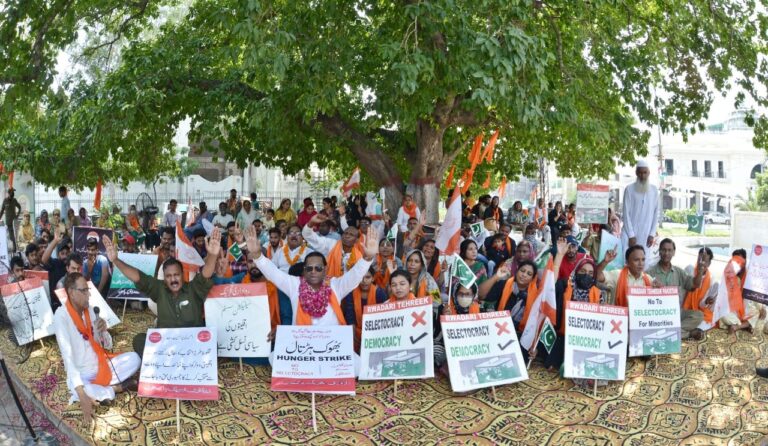
Political leaders, civil society, human rights activists, and religious leaders have called upon the government to safeguard all citizens’ rights irrespective of their religion and protect their life and property.
The founder of Pakistan, Quaid-i-Azam Muhammad Ali Jinnah, envisioned Pakistan to become a peaceful country where all citizens had the right to enjoy equality and were free to practice their faiths, they said on the occasion of National Day for Minorities.
In his message, Church of Pakistan’s President Bishop Dr Azad Marshall said August 11 was observed as the National Day of Minorities to pay tribute to the minority community for their services in establishing Pakistan and nation building.
“Quaid-e-Azam Muhammad Ali Jinnah, in his speech on August 11, 1947, had pledged to protect the rights of non-Muslims in the newly-created country. In his landmark speech, Jinnah expressed his desire to see a tolerant, progressive, liberal, and egalitarian Pakistan, but we have failed to adopt his vision,” Bishop Marshall said.
Marshall said that history is witness to the fact that non-Muslim citizens have contributed wholeheartedly to nation-building and their services in various spheres of life have helped put the country on the path to progress.
He said that though successive governments have claimed that they have worked for the uplift and protection of non-Muslim Pakistani citizens, yet the religious minorities continue to face many challenges due to the absence of a proper enforcement mechanism.
“Though Pakistan’s constitution guarantees protection of religious minorities and assures them equal rights, I believe that disparities of rights in policies and laws can never ensure equality of status and treatment. Inherent discriminatory practices, forced conversions of minority girls, incidents of faith-based violence and continued misuse of the blasphemy laws are some of the major issues that warrant a serious and instant response from the State if we are to truly follow the Quaid’s vision of a pluralistic Pakistan,” he said.
BILAWAL PROPOSES OVERSIGHT COMMITTEE
Separately, Foreign Minister Bilawal Bhutto Zardari has proposed constituting a ‘Parliamentary Oversight Committee’ to resolve the issues related to minorities. especially forced conversion of minor girls.
Addressing a minority convention organised in Parliament House, the foreign minister said that forced conversion of religion was not allowed in Pakistan’s constitution, besides Islam also prohibited conversion to Islam by coercion.
He said that the government had tried to ensure implementation on minority quota and urged the National Assembly to ensure proper implementation on minority quota in government offices by passing effective legislation.
Bilawal said that practical steps were being taken to improve the lot of minorities as our actions would prove that every citizen has equal status.
CHRISTIANS HOLD RALLIES & HUNGER STRIKE
Meanwhile, several Christian organisations marked the National Day of Minorities with calls for direct voting for minority MPs to stop forced conversions of non-Muslim girls and misuse of the anti-blasphemy law.
Addressing a rally in Islamabad, Chairman of the Minorities Alliance Pakistan Akmal Bhatti said that incidents of kidnapping, rape and coercion of minor girls have been rapidly increasing in the country.
He said political, social and economic exploitation of religious minorities is contrary to Jinnah’s teachings, adding that the reckless use of sensitive religious laws and extrajudicial killings continues but the state seems to be helpless against such elements.
Other speakers demanded electoral reforms as they claim that the present system has introduced a culture of nepotism, bribery and flattery and closed the door to genuine representation of minorities.
Under present laws, political parties have been appointing handpicked minority representatives in the assemblies, which is against democracy, they said.
Under the current system, religious minorities join others in voting for local representation in the national and provincial assemblies. The leadership of the mainstream political parties only selects non-Muslim candidates by granting them tickets for the few seats reserved for minorities. Currently, religious minorities can contest only 33 reserved seats in provincial assemblies and four seats in the Senate.
The interfaith Rawadari Tehreek staged a hunger strike in front of the Punjab Provincial Assembly in Lahore to reject the reserved seats for minority parliamentarians and demanded urgent reforms to elect their representatives with their own votes.
Activists of Voice for Justice held demonstrations in five cities demanding the protection of religious freedom.
Former Christian government minister Shahbaz Bhatti led the campaign to have Aug. 11 declared National Day of Minorities in 2009. He was assassinated in 2011 in a gun attack in Islamabad.